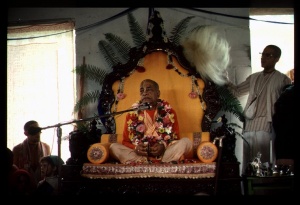SB 9.6.8: Difference between revisions
m (1 revision(s)) |
(Vanibot #0054 edit - transform synonyms into clickable links, which search similar occurrences) |
||
| (One intermediate revision by one other user not shown) | |||
| Line 1: | Line 1: | ||
{{info | {{info | ||
|speaker= | |speaker=Śukadeva Gosvāmī | ||
|listener=King | |listener=King Parīkṣit | ||
}} | }} | ||
[[Category:Srimad-Bhagavatam - Canto 09 Chapter 06|s08 ]] | |||
[[Category:Bhagavatam Verses Spoken by Sukadeva Gosvami - Vanisource|090608]] | |||
<div style="float:left">'''[[Srimad-Bhagavatam]] - [[SB 9|Ninth Canto]] - [[SB 9.6: The Downfall of Saubhari Muni|Chapter 6: The Downfall of Saubhari Muni]]'''</div> | |||
<div style="float:right">[[File:Go-previous.png|link=SB 9.6.7]] '''[[SB 9.6.7]] - [[SB 9.6.9]]''' [[File:Go-next.png|link=SB 9.6.9]]</div> | |||
{{RandomImage}} | |||
==== TEXT 8 ==== | ==== TEXT 8 ==== | ||
<div | <div class="verse"> | ||
śeṣaṁ nivedayām āsa | :śeṣaṁ nivedayām āsa | ||
pitre tena ca tad-guruḥ | :pitre tena ca tad-guruḥ | ||
coditaḥ prokṣaṇāyāha | :coditaḥ prokṣaṇāyāha | ||
duṣṭam etad akarmakam | :duṣṭam etad akarmakam | ||
</div> | </div> | ||
| Line 17: | Line 22: | ||
==== SYNONYMS ==== | ==== SYNONYMS ==== | ||
<div | <div class="synonyms"> | ||
''[//vanipedia.org/wiki/Special:VaniSearch?s=śeṣam&tab=syno_o&ds=1 śeṣam]'' — the remnants; ''[//vanipedia.org/wiki/Special:VaniSearch?s=nivedayām&tab=syno_o&ds=1 nivedayām] [//vanipedia.org/wiki/Special:VaniSearch?s=āsa&tab=syno_o&ds=1 āsa]'' — he offered; ''[//vanipedia.org/wiki/Special:VaniSearch?s=pitre&tab=syno_o&ds=1 pitre]'' — to his father; ''[//vanipedia.org/wiki/Special:VaniSearch?s=tena&tab=syno_o&ds=1 tena]'' — by him; ''[//vanipedia.org/wiki/Special:VaniSearch?s=ca&tab=syno_o&ds=1 ca]'' — also; ''[//vanipedia.org/wiki/Special:VaniSearch?s=tat&tab=syno_o&ds=1 tat]-[//vanipedia.org/wiki/Special:VaniSearch?s=guruḥ&tab=syno_o&ds=1 guruḥ]'' — their priest or spiritual master; ''[//vanipedia.org/wiki/Special:VaniSearch?s=coditaḥ&tab=syno_o&ds=1 coditaḥ]'' — being requested; ''[//vanipedia.org/wiki/Special:VaniSearch?s=prokṣaṇāya&tab=syno_o&ds=1 prokṣaṇāya]'' — for purifying; ''[//vanipedia.org/wiki/Special:VaniSearch?s=āha&tab=syno_o&ds=1 āha]'' — said; ''[//vanipedia.org/wiki/Special:VaniSearch?s=duṣṭam&tab=syno_o&ds=1 duṣṭam]'' — polluted; ''[//vanipedia.org/wiki/Special:VaniSearch?s=etat&tab=syno_o&ds=1 etat]'' — all this flesh; ''[//vanipedia.org/wiki/Special:VaniSearch?s=akarmakam&tab=syno_o&ds=1 akarmakam]'' — not fit to be used for offering in ''śrāddha''. | |||
</div> | </div> | ||
| Line 24: | Line 29: | ||
==== TRANSLATION ==== | ==== TRANSLATION ==== | ||
<div | <div class="translation"> | ||
Vikukṣi offered the remnants of the flesh to King Ikṣvāku, who gave it to Vasiṣṭha for purification. But Vasiṣṭha could immediately understand that part of the flesh had already been taken by Vikukṣi, and therefore he said that it was unfit to be used in the śrāddha ceremony. | Vikukṣi offered the remnants of the flesh to King Ikṣvāku, who gave it to Vasiṣṭha for purification. But Vasiṣṭha could immediately understand that part of the flesh had already been taken by Vikukṣi, and therefore he said that it was unfit to be used in the śrāddha ceremony. | ||
</div> | </div> | ||
| Line 31: | Line 36: | ||
==== PURPORT ==== | ==== PURPORT ==== | ||
<div | <div class="purport"> | ||
That which is meant to be offered in yajña cannot be tasted by anyone before being offered to the Deity. In our temples, this regulation is in effect. One cannot eat food from the kitchen unless it is offered to the Deity. If something is taken before being offered to the Deity, the entire preparation is polluted and can no longer be offered. Those engaged in Deity worship must know this very well so that they may be saved from committing offenses in Deity worship. | That which is meant to be offered in ''yajña'' cannot be tasted by anyone before being offered to the Deity. In our temples, this regulation is in effect. One cannot eat food from the kitchen unless it is offered to the Deity. If something is taken before being offered to the Deity, the entire preparation is polluted and can no longer be offered. Those engaged in Deity worship must know this very well so that they may be saved from committing offenses in Deity worship. | ||
</div> | </div> | ||
__NOTOC__ | |||
<div style="float:right; clear:both;">[[File:Go-previous.png|link=SB 9.6.7]] '''[[SB 9.6.7]] - [[SB 9.6.9]]''' [[File:Go-next.png|link=SB 9.6.9]]</div> | |||
__NOTOC__ | |||
__NOEDITSECTION__ | |||
Latest revision as of 16:14, 19 February 2024

A.C. Bhaktivedanta Swami Prabhupada
TEXT 8
- śeṣaṁ nivedayām āsa
- pitre tena ca tad-guruḥ
- coditaḥ prokṣaṇāyāha
- duṣṭam etad akarmakam
SYNONYMS
śeṣam — the remnants; nivedayām āsa — he offered; pitre — to his father; tena — by him; ca — also; tat-guruḥ — their priest or spiritual master; coditaḥ — being requested; prokṣaṇāya — for purifying; āha — said; duṣṭam — polluted; etat — all this flesh; akarmakam — not fit to be used for offering in śrāddha.
TRANSLATION
Vikukṣi offered the remnants of the flesh to King Ikṣvāku, who gave it to Vasiṣṭha for purification. But Vasiṣṭha could immediately understand that part of the flesh had already been taken by Vikukṣi, and therefore he said that it was unfit to be used in the śrāddha ceremony.
PURPORT
That which is meant to be offered in yajña cannot be tasted by anyone before being offered to the Deity. In our temples, this regulation is in effect. One cannot eat food from the kitchen unless it is offered to the Deity. If something is taken before being offered to the Deity, the entire preparation is polluted and can no longer be offered. Those engaged in Deity worship must know this very well so that they may be saved from committing offenses in Deity worship.